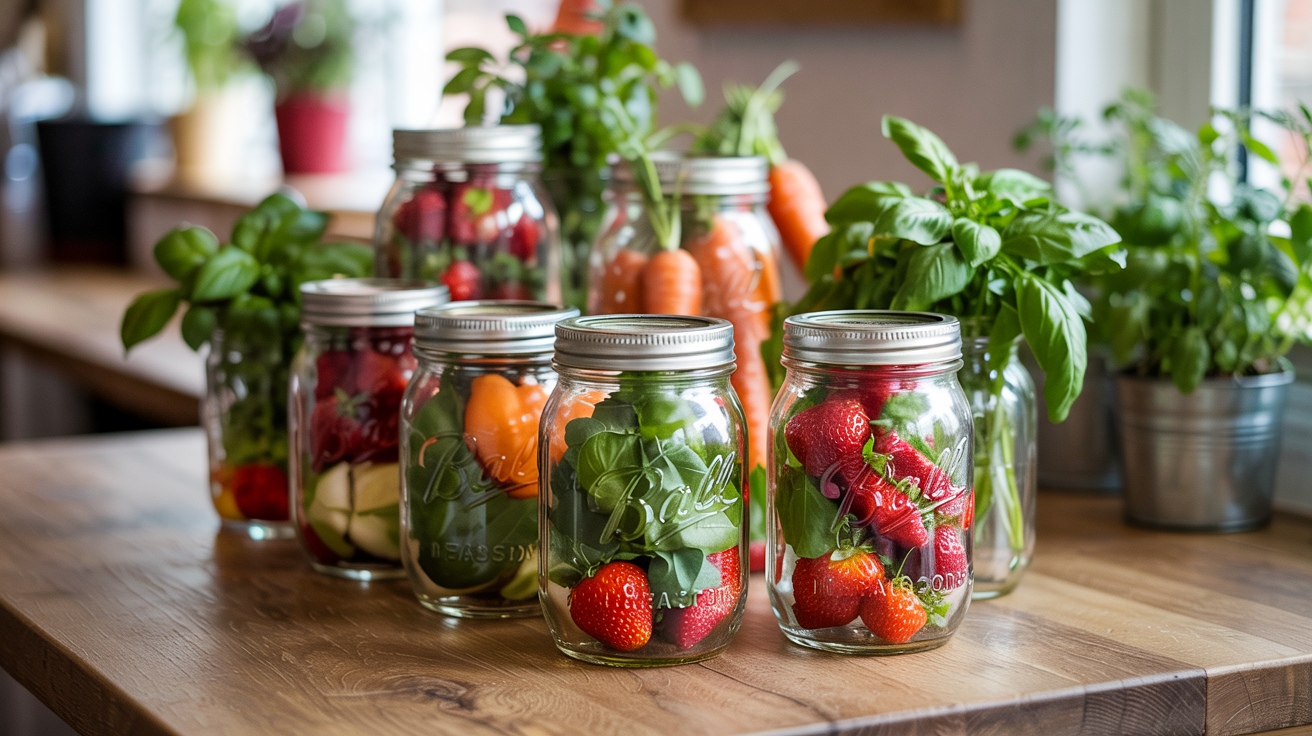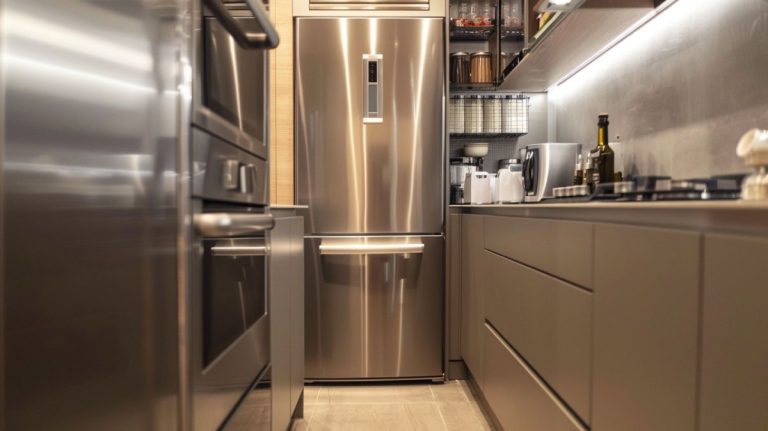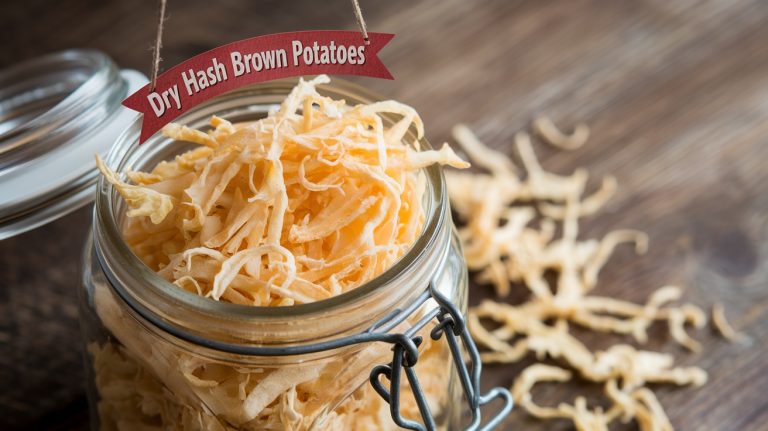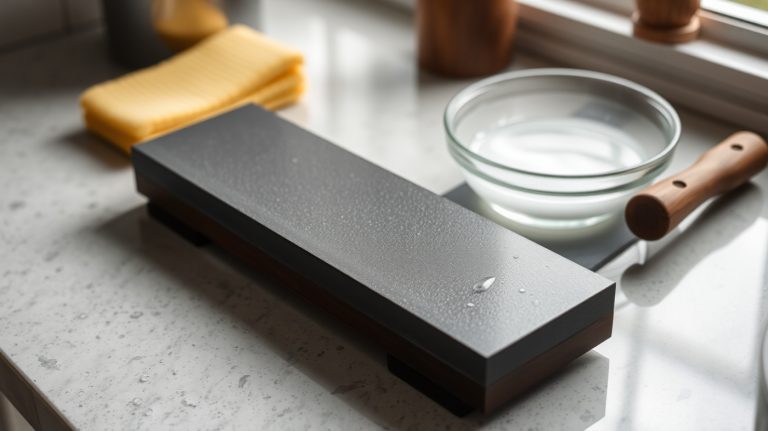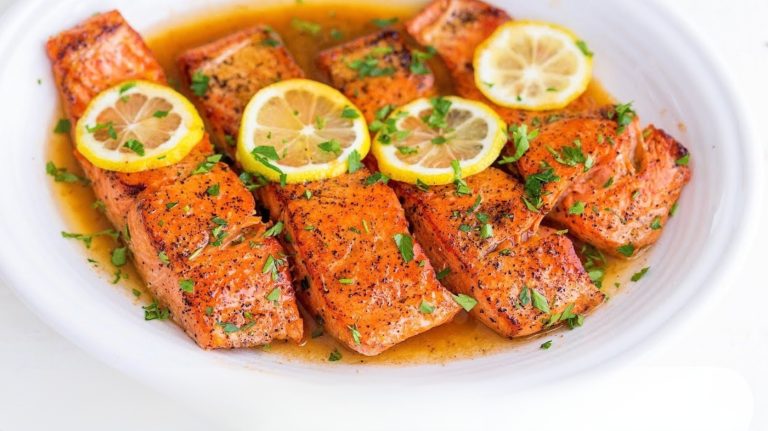How to Store Fruits and Vegetables in Mason Jars? Easy Tips
To store fruits and vegetables in mason jars, start by selecting fresh, firm produce to guarantee quality. Wash them thoroughly to eliminate dirt and bacteria.
Prepare fruits by peeling or pitting as needed, and for vegetables, wash and cut them into suitable sizes. Make certain to use clean, sanitized jars and secure lids tightly for a good seal.
Store the jars in a cool, dark place to maintain freshness. There’s much more to explore about preserving your produce effectively.
Key Takeaways
- Select fresh, firm produce and inspect for spoilage before storing in mason jars.
- Wash and dry fruits and vegetables thoroughly to minimize bacteria before jar storage.
- Use appropriate jar sizes to optimize storage conditions for different types of produce.
- Seal jars tightly and store them in a cool, dark, and dry place to maintain freshness.
- Regularly check for signs of spoilage and replace any compromised items promptly.
Essential Tools for Mason Jar Storage
When it comes to using mason jars for storage, having the right tools is essential. Below are the must-have items that will ensure your fruits, vegetables, and other produce stay fresh for longer while maintaining their quality.
Jar Lifters Importance
Although canning may seem straightforward, safely handling hot jars is essential to avoid burns and guarantee successful preservation. That’s where jar lifters come in. These tools are vital for securely removing jars from boiling water, ensuring you don’t risk injury or spills.
Here are key benefits of using jar lifters:
- Prevents burns: They allow you to lift jars without direct hand contact with hot surfaces.
- Minimizes spills: Maintaining an upright position during removal helps avoid seal failures.
- Enhances safety: Ergonomic designs provide a better grip, reducing the chance of dropping jars.
- Improves efficiency: Quick release mechanisms streamline your canning process, making it easier to engage with the process and enjoy the satisfaction of preserving your own food. Additionally, using proper lids ensures that food remains fresh during storage.
Canning Funnels Benefits
Canning funnels play an essential role in ensuring your fruit and vegetable preservation efforts are both efficient and mess-free.
These tools are designed to fit snugly into mason jars, minimizing spills and waste during the transfer process. By using a canning funnel, you not only maintain cleanliness but also reduce the risk of contamination, ultimately enhancing the preservation quality of your produce.
They help you achieve even headspace in jars, which is critical for successful canning. Available in various sizes, these funnels accommodate different jar types, making them versatile.
Additionally, many modern funnels feature silicone grips for stability and measurement markings for precise filling, ensuring your canning experience is both smooth and reliable. Furthermore, having funnels for various jar sizes allows for greater flexibility in your canning projects.
Preparing Fruits for Mason Jar Storage
To ensure your fruits are ready for mason jar storage, start by selecting the right varieties, focusing on those with firm textures and high acidity like apples, peaches, and berries.
Avoid high water content fruits such as watermelon and those prone to discoloration like bananas.
Follow these steps for ideal preparation:
- Wash under cold water to remove dirt and bacteria.
- Peel, core, or pit fruits as necessary to enhance preservation.
- Cut fruits into your desired sizes for storage.
- Dry berries thoroughly to prevent mold formation. Additionally, storing your fruits in glass jars can help extend their life by keeping out air and preventing bacteria growth.
Preparing Vegetables for Mason Jar Storage
When preparing vegetables for mason jar storage, it’s important to follow a few key steps to ensure maximum freshness and longevity. Start by thoroughly washing the vegetables to remove dirt and reduce bacteria.
For veggies like carrots and potatoes, peeling enhances their storage quality. Next, cut the vegetables to fit them nicely in jars and improve their appearance.
Additionally, consider using mason jars filled with water to store root vegetables like carrots and potatoes, as this method helps prolong their freshness. It’s also beneficial to use oxygen absorbers to help maintain the freshness of stored vegetables by removing excess oxygen from the jars.
After cutting, remove excess moisture by drying them; this helps prevent mold growth. Store prepared vegetables in the refrigerator, maintaining a consistent temperature for ideal freshness.
Remember that different vegetables have unique storage needs—root vegetables can be submerged in water, while leafy greens thrive in dry conditions.
Choosing the Right Mason Jar Type
When it comes to storing fruits and vegetables, selecting the right mason jar type is essential for maximizing freshness and convenience.
You’ll find that regular mouth jars offer a tighter seal and better stackability, while wide mouth jars provide easier access and cleaning. Consider the size and lid options available to best suit your storage needs and enhance your kitchen organization.
Additionally, using glass jars for storage instead of plastic containers can significantly extend the freshness of your produce. The airtight sealing features of mason jars help maintain the integrity of fruits and vegetables over time.
Regular vs. Wide-Mouth
Choosing between regular and wide-mouth mason jars can greatly impact how you store your fruits and vegetables. Here are some key points to evaluate:
- Size and Shape: Regular mouth jars have a narrower opening, making them ideal for smaller items, while wide mouth jars accommodate bulkier foods.
- Ease of Use: Wide mouth jars are easier to fill and clean, which can save you time during meal prep. Additionally, the larger diameter of wide mouth jars simplifies the process of adding larger items or food pieces.
- Storage Efficiency: Regular mouth jars fit more densely in canners, but wide mouth jars allow easier access to your stored items.
- Seal Quality: Regular mouth jars provide a tighter seal, beneficial for items needing precise pouring, like sauces.
Jar Sizes Explained
Understanding the different sizes of mason jars can greatly improve your food storage practices.
Small jars, like the 4 oz and 8 oz options, are perfect for single-serve spices, jams, and small batches of sauces. If you need something for dips or dry goods, consider the 10 oz jar. Layering ingredients in mason jars can also enhance meal prep efficiency for quick access to various recipes.
Medium jars, such as the 16 oz pint, are versatile for canning fruits and soups, while the 24 oz jars excel at storing bulk items like pasta. Medium jars are commonly used for meal prep and organization.
For larger storage needs, 32 oz quart jars are ideal for pickles and larger quantities, and the 64 oz half-gallon jars work well for kombucha or pantry staples. Choosing the right size guarantees your fruits and vegetables stay fresh and organized.
Lid Options Available
Selecting the right lid for your mason jars can make a significant difference in how well your fruits and vegetables stay fresh. Here are some lid options to evaluate:
- Two-Piece Lids: These come with a flat lid and a rubber seal, ensuring an airtight environment. Noise reduction technology is essential to maintain the quality of stored produce by minimizing exposure to air.
- BPA-Free Options: Choose modern lids made without BPA for safer food storage.
- Reusable Lids: Many lids can be cleaned and reused, making them cost-effective. Additionally, using wide-mouth design mason jars can enhance filling and access convenience.
- Leak-Resistant Design: Opt for lids designed to prevent leaks, keeping contents secure and fresh.
How to Use Lids and Bands Effectively?
When it comes to effectively using lids and bands for storing fruits and vegetables, proper preparation is key to achieving a secure seal.
Start by cleaning your jar, lid, and band to prevent contamination. Choose lids that fit your jar’s mouth size—either regular or wide—and consider materials like metal or silicone for different storage needs. Ensure you select the right mouth size for your jars to optimize the sealing process.
When sealing, screw the band down until it’s finger-tight to guarantee an airtight seal. Use bubble removers to eliminate air bubbles before sealing.
After processing, check the seal by pressing the lid’s center for flex. Store your sealed jars in a cool, dry place to maintain freshness.
Tips for Maximizing Shelf Life
After securing your jars with the right lids and bands, it’s time to focus on maximizing the shelf life of your fruits and vegetables.
Follow these practical tips to guarantee your produce stays fresh longer:
- Choose fresh produce: Select items from reputable suppliers to boost their longevity.
- Wash and dry thoroughly: Clean your fruits and veggies to remove bacteria, then dry them to prevent moisture buildup. Storing berries in mason jars may offer a better alternative to flimsy plastic containers.
- Store properly: Keep jars in a cool, dark, and dry space, away from direct sunlight.
- Monitor regularly: Check for signs of spoilage or contamination, and replace any compromised items promptly.
Frequently Asked Questions
How Long Can I Store Fruits and Vegetables in Mason Jars?
You can store fruits and vegetables in mason jars for varying durations, with fruits like berries lasting up to a week.
Vegetables such as leafy greens can also maintain freshness for about a week. The key is thorough washing and drying before storage to prevent moisture buildup. Always keep them in the refrigerator to maximize freshness.
Can I Mix Different Types of Produce in One Jar?
Mixing different types of produce in one jar can be a balancing act. You want vibrant colors and flavors, but cross-contamination can spoil your efforts. If you choose to mix, consider the moisture and acidity levels; keep high-moisture items separate from low-moisture ones.
Soft fruits and strong-smelling veggies might clash, too. So, while it’s tempting to create a colorful medley, make certain each type you combine complements the others for maximum storage.
Do I Need to Refrigerate Mason Jars After Filling?
You don’t need to refrigerate mason jars after filling them, as long as they’ve been properly sealed. Confirm you’ve applied the lids correctly and processed them for the right amount of time.
Store sealed jars in a cool, dark place to maintain freshness. However, if you notice any leaks or if a jar didn’t seal properly, refrigerate it immediately and use the contents soon to prevent spoilage. Always check seals before storage.
What Can I Do if My Mason Jar Seals Don’t Work?
When your mason jar seals don’t work, it’s like a balloon that just won’t inflate. First, identify the problem—check for cracks, food on the rim, or old lids. Replace lids if needed, and make certain you’re using the right processing time and temperature.
If the seal’s still failing, reprocess the jars using fresh lids and clean jars. Always listen for that satisfying “ping” to confirm your jars are sealed properly!
How Can I Tell if Stored Produce Has Gone Bad?
To tell if your stored produce has gone bad, check for mold growth, foul odors, or unnatural colors. Feel for softness or mushiness in fruits and vegetables, as these indicate deterioration.
Examine berries for moisture, and watch for shriveling in fruits like cherries. For vegetables, guarantee root veggies aren’t soft or moist.
Always discard overripe fruits promptly to prevent them from affecting others. Inspect any containers for leaks or bulging lids too.
Store Fruits and Vegetables in Mason Jars the Right Way and Enjoy Freshness for Longer
By following these steps, you can effectively store fruits and vegetables in mason jars, ensuring they stay fresh and vibrant longer.
Cleanliness is essential, so always start with sanitized jars and fresh produce. Remember to prepare your fruits and veggies properly and make the most of your lids and bands.
With a little creativity, you can even display your colorful jars as decor. Embrace this practical method, and enjoy the benefits of home-preserved goodness.

